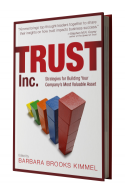Earlier this week I was given a gift, the opportunity to chat about trust with 150 very smart college kids, members of the millennial generation.
A small group met for dinner before class, including two international students who shared their stories about trust and cultural differences. For example, in some countries it is impolite to make eye contact with someone who is older. This is viewed as disrespectful and untrustworthy. Imagine walking into a job interview in the US and being unwilling to make eye contact with the interviewer!
We began our class discussion by asking three questions but ran short on time before the third topic.
Question #1: Whom do you trust the most?
Answer #1: Family- Mother, father and siblings. We discussed the special bonds among family members that create trustworthy relationships and how these same characteristics translate into larger organizations.
- Familiarity
- Longevity
- Common values
- Having “your back”
- Culture
Question #2: What company do you trust the most?
Answer #2: Google and Apple- The water became a bit murky as the students explored differences between “liking a product” and “trusting a company” and between consumer perceptions and organizational trustworthiness.
We discussed the lack of transparency at these particular companies and the chapter in our book Trust Inc., addressing Apple as a case study in trust. Several students shared their strong beliefs about corporate responsibility vs. corporate window dressing.
The discussion then turned to:
Target’s security breach: The majority concluded that the breach will not inhibit them from shopping at Target.
Trust in government: The students felt strongly that our government does a good job to protect its citizens. They accept that lying is the “norm” in politics. Many said they would vote for Chris Christie even if a determination is made that he lied about the lane closures in Fort Lee.
Wrapping up, we reminded the kids that they live in an era of radical transparency. It’s becoming increasingly difficult to hide bad behavior.
We emphasized the importance of entering the work force with not only a clean slate, but also knowledge of the importance of leading with trust.
Bottom line, the students were very engaged in the “trust conversation.” Perhaps it should be held on more college campuses. What do you think?
Share your comments with me. barbara@trustacrossamerica.com



Recent Comments